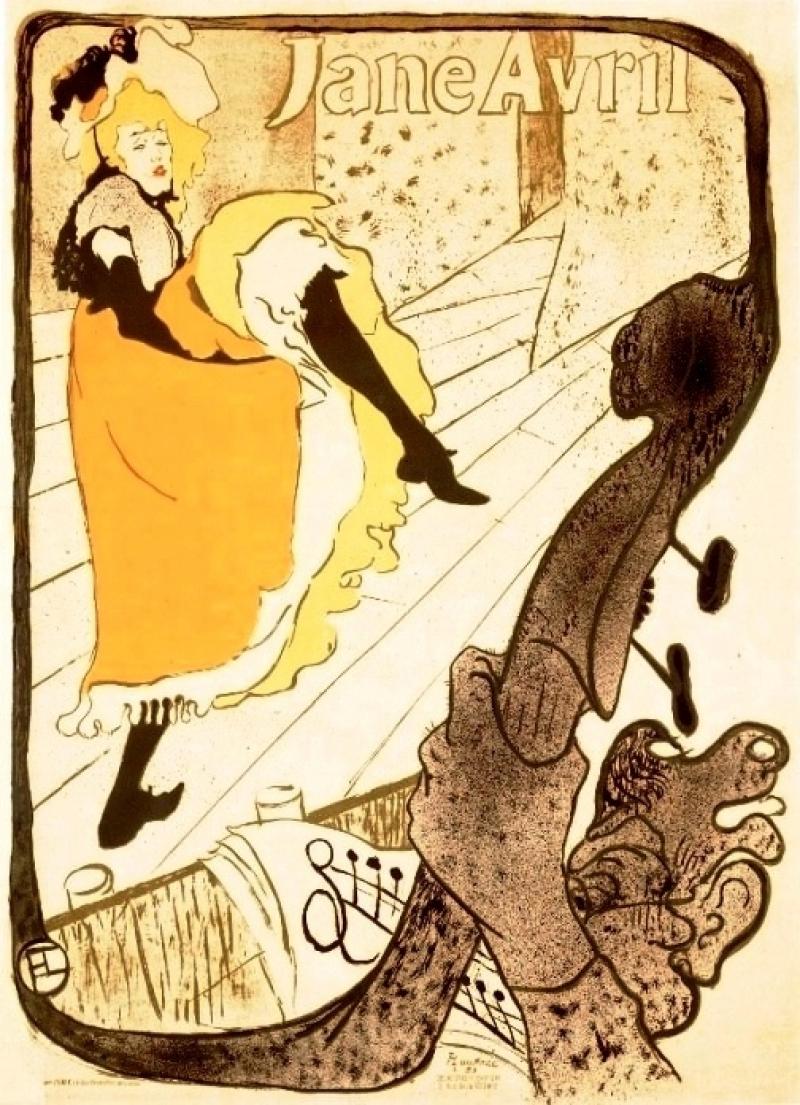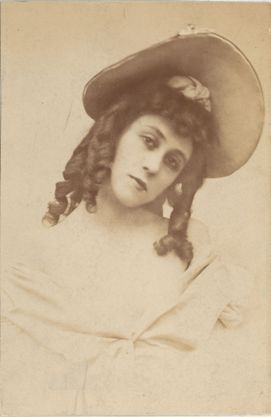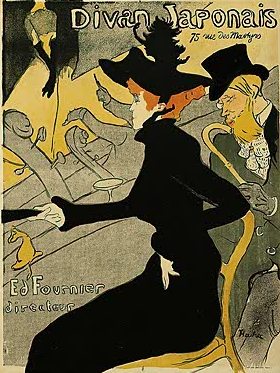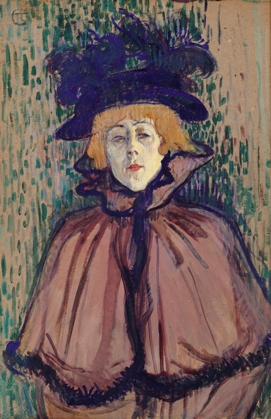Toulouse-Lautrec and Jane Avril: Beyond the Moulin Rouge, Courtauld Gallery | reviews, news & interviews
Toulouse-Lautrec and Jane Avril: Beyond the Moulin Rouge, Courtauld Gallery
Toulouse-Lautrec and Jane Avril: Beyond the Moulin Rouge, Courtauld Gallery
Striking images of the French artist's high-kicking muse

As one of the stars of the Moulin Rouge, she was variously known by the nicknames "La Mélinite", "Jane la Folle", and "L’Etrange". The first was after a brand of explosive, the other two attesting to a little craziness. Jane Avril’s eccentric dance movements evoked the involuntary spasms of female hysteria patients.
 It was Lautrec’s innovative lithographs, displayed in the advertising posters that lined the Boulevard de Clichy in the bohemian district of Montmartre, that made Avril’s name. She was among a number of cabaret performers immortalised by Lautrec in a line-up that included the sexually provocative "La Goulue" ("The Glutton", so-called either because of her sexual appetites or her habit of downing customers' drinks in one as she worked the floor), the gurning-featured chanteuse Yvette Gilbert (like Avril (pictured right) she was less odd-looking in photographs), and the singer and nightclub owner Aristide Bruant, familiar in flamboyant red scarf and mouth twisted in disdainful sneer.
It was Lautrec’s innovative lithographs, displayed in the advertising posters that lined the Boulevard de Clichy in the bohemian district of Montmartre, that made Avril’s name. She was among a number of cabaret performers immortalised by Lautrec in a line-up that included the sexually provocative "La Goulue" ("The Glutton", so-called either because of her sexual appetites or her habit of downing customers' drinks in one as she worked the floor), the gurning-featured chanteuse Yvette Gilbert (like Avril (pictured right) she was less odd-looking in photographs), and the singer and nightclub owner Aristide Bruant, familiar in flamboyant red scarf and mouth twisted in disdainful sneer.
The Courtauld Gallery's small but exquisite jewel of an exhibition focuses on just a handful of his posters, as well as paintings and oil sketches that portray the offstage Avril as a melancholy, private figure, in contrast to the confident performer she was. And as an adjunct to the main display, we gain a fascinating insight into Avril's difficult life. Born Jeanne Beaudon, the daughter of a prostitute (she adopted the English pseudonym on the suggestion of an English lover), Avril spent two years as a teenager at the Salpêtrière Hospital. She was treated for the nervous condition St Vitus's Dance, a fact she later exploited in her jerky dance style, owing to the popular fascination with the new science of mental disorders.
 We also explore the intimate relationship between artist and subject. In one photograph we see Lautrec dressed in Avril’s clothes for a fancy dress party. We are never sure, however, whether their evident intimacy, conveyed through some of his most tender paintings of her, ever became sexual.
We also explore the intimate relationship between artist and subject. In one photograph we see Lautrec dressed in Avril’s clothes for a fancy dress party. We are never sure, however, whether their evident intimacy, conveyed through some of his most tender paintings of her, ever became sexual.
But we begin with the exuberant lithographs.The brilliance of Lautrec’s compositional sense can be seen in his 1893 poster, Avril at the Jardin de Paris (main picture). The double-bass frames the stage on which Avril, in her floppy bonnet, performs her high kicks. The simplified forms, the limited palette and flat colours show the distinctive influence of Japanese prints, but the clever, radical composition is all his own. What's more, the radical framing manages to cocoon her, to distance her from the viewer: this ethereal creature of the stage wears a far-away expression, part weary, part trance-like.
In Divan Japonais (pictured above left), 1893, the first work in which he portrayed her, all is sinuous lines and curves. Seated in the audience, Avril’s lithe figure is dressed strikingly in black. Lautrec's palette is again a reduction to three main colours, black, yellow and grey, with only a reddish-orange for Avril’s hair, and for her thinly pursed lips. But what incredible compositional flair: the arms of the two double-basses echo the raised arms of the conductor, their line following an upward curve and all framed within the elegant curve of Avril’s chest and extended arm.
 Lautrec’s paintings of Avril are quite different in mood. In his great group composition At the Moulin Rouge, 1892-3, we observe her from behind, her distinctive red hair dressed in a flouncy hat, her angular shoulders accentuated by a bristling fur trim. The garish lighting makes those whose faces can be seen look as if they are masked, especially the looming, rather terrifying face of May Milton, a fellow dancer and close friend of Avril. In other paintings she is alone and isolated, cutting a sad and vulnerable figure, particularly in her long, oversized coat. However, in one striking portrait, Jane Avril (pictured right), 1891-2, dressed in an elaborately plumed hat and ruff-like high-collared cape, she evinces a positively magisterial air.
Lautrec’s paintings of Avril are quite different in mood. In his great group composition At the Moulin Rouge, 1892-3, we observe her from behind, her distinctive red hair dressed in a flouncy hat, her angular shoulders accentuated by a bristling fur trim. The garish lighting makes those whose faces can be seen look as if they are masked, especially the looming, rather terrifying face of May Milton, a fellow dancer and close friend of Avril. In other paintings she is alone and isolated, cutting a sad and vulnerable figure, particularly in her long, oversized coat. However, in one striking portrait, Jane Avril (pictured right), 1891-2, dressed in an elaborately plumed hat and ruff-like high-collared cape, she evinces a positively magisterial air.
This is a stunning exhibition that looks not only at the many faces of Jane Avril but casts an illuminating light upon Lautrec’s deep engagement with the seamy Belle Époque world he brought to life and immortalised with breathtaking verve.
- Toulouse-Lautrec and Jane Avril: Beyond the Moulin Rouge at the Courtauld Gallery until 18 September
 Find books on Toulouse-Lautrec on Amazon
Find books on Toulouse-Lautrec on Amazon
Explore topics
Share this article
The future of Arts Journalism
You can stop theartsdesk.com closing!
We urgently need financing to survive. Our fundraising drive has thus far raised £49,000 but we need to reach £100,000 or we will be forced to close. Please contribute here: https://gofund.me/c3f6033d
And if you can forward this information to anyone who might assist, we’d be grateful.

Subscribe to theartsdesk.com
Thank you for continuing to read our work on theartsdesk.com. For unlimited access to every article in its entirety, including our archive of more than 15,000 pieces, we're asking for £5 per month or £40 per year. We feel it's a very good deal, and hope you do too.
To take a subscription now simply click here.
And if you're looking for that extra gift for a friend or family member, why not treat them to a theartsdesk.com gift subscription?
more Visual arts
 'We are bowled over!' Thank you for your messages of love and support
Much-appreciated words of commendation from readers and the cultural community
'We are bowled over!' Thank you for your messages of love and support
Much-appreciated words of commendation from readers and the cultural community
 Folkestone Triennial 2025 - landscape, seascape, art lovers' escape
Locally rooted festival brings home many but not all global concerns
Folkestone Triennial 2025 - landscape, seascape, art lovers' escape
Locally rooted festival brings home many but not all global concerns
 Sir Brian Clarke (1953-2025) - a personal tribute
Remembering an artist with a gift for the transcendent
Sir Brian Clarke (1953-2025) - a personal tribute
Remembering an artist with a gift for the transcendent
 Emily Kam Kngwarray, Tate Modern review - glimpses of another world
Pictures that are an affirmation of belonging
Emily Kam Kngwarray, Tate Modern review - glimpses of another world
Pictures that are an affirmation of belonging
 Kiefer / Van Gogh, Royal Academy review - a pairing of opposites
Small scale intensity meets large scale melodrama
Kiefer / Van Gogh, Royal Academy review - a pairing of opposites
Small scale intensity meets large scale melodrama
 Jenny Saville: The Anatomy of Painting, National Portrait Gallery review - a protégé losing her way
A brilliant painter in search of a worthwhile subject
Jenny Saville: The Anatomy of Painting, National Portrait Gallery review - a protégé losing her way
A brilliant painter in search of a worthwhile subject
 Abstract Erotic, Courtauld Gallery review - sculpture that is sensuous, funny and subversive
Testing the boundaries of good taste, and winning
Abstract Erotic, Courtauld Gallery review - sculpture that is sensuous, funny and subversive
Testing the boundaries of good taste, and winning
 Edward Burra, Tate Britain review - watercolour made mainstream
Social satire with a nasty bite
Edward Burra, Tate Britain review - watercolour made mainstream
Social satire with a nasty bite
 Ithell Colquhoun, Tate Britain review - revelations of a weird and wonderful world
Emanations from the unconscious
Ithell Colquhoun, Tate Britain review - revelations of a weird and wonderful world
Emanations from the unconscious
 Rachel Jones: Gated Canyons, Dulwich Picture Gallery review - teeth with a real bite
Mouths have never looked so good
Rachel Jones: Gated Canyons, Dulwich Picture Gallery review - teeth with a real bite
Mouths have never looked so good
 Yoshitomo Nara, Hayward Gallery review - sickeningly cute kids
How to make millions out of kitsch
Yoshitomo Nara, Hayward Gallery review - sickeningly cute kids
How to make millions out of kitsch
 Hamad Butt: Apprehensions, Whitechapel Gallery review - cool, calm and potentially lethal
The YBA who didn’t have time to become a household name
Hamad Butt: Apprehensions, Whitechapel Gallery review - cool, calm and potentially lethal
The YBA who didn’t have time to become a household name

Add comment